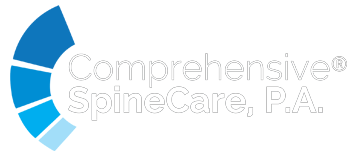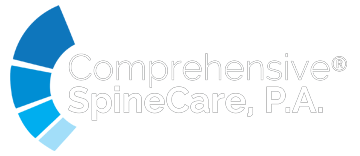A herniated disc, commonly referred to as a “slipped” or “ruptured” disc, is one of the most common conditions for which a patient will consult a spine specialist.
A herniated disc may occur anywhere in the cervical (neck area), lumbar (lower back area), or thoracic (chest area) regions of the spine. When a disc becomes herniated, a portion of the disc moves into the spinal canal, causing pressure on the spinal cord or the spinal nerves.
The disc (intervertebral disc) acts as a compression cushion between the bones (vertebrae) along the spinal column. The disc is an extremely important structure, which allows for spinal motion while helping to protect the spinal cord, as well as the nerves in the spinal canal.
A herniated disc is a common injury that can affect any part of the spine. A herniated disc can cause pain, numbness or weakness in the arms or legs.
At Comprehensive Spine Care, P.A., located across Westwood, Clifton, Bridgewater, and Brunswick, NJ, we are dedicated to helping you understand this condition and offering advanced treatments to address it.

Normal

Disc Herniation
Symptoms:
The symptoms of a herniated disc depend upon where in the body the herniated disc occurs, and if there is significant enough pressure on the nerve.
Symptoms can be relatively mild to quite painful, drastically limiting mobility and leaving the patient incapacitated, depending upon the type of disc herniation, as well as its positioning.
Signs Indicative of a Herniated Disc
A herniated disc is a spinal condition that can manifest in several distinct ways. Understanding these signs is crucial for early detection and effective treatment:
- Persistent Pain: One of the most telling symptoms is continuous pain that doesn’t seem to let up. This discomfort often isn’t limited to the back or neck. Depending on where the herniated disc is located, this pain can radiate down your arms or legs, following the path of affected nerves.
- Numbness or Tingling Sensations: Along with pain, many individuals experience a tingling or “pins and needles” sensation. This numbness can occur in the specific area where the herniated disc is pressing against a nerve. For instance, a herniated disc in the lower spine might cause these sensations in a leg or foot.
- Muscle Weakness: The affected nerves due to the herniated disc can lead to muscle weakness. This might manifest as frequent stumbling when walking or a sudden inability to lift objects as you used to. It can even affect your grip in some cases, making it hard to hold onto things.
- Pain Aggravation with Movements: It’s not uncommon for individuals with a herniated disc to notice a spike in pain during specific movements. Simple activities like bending, lifting, or turning can intensify the discomfort. For some, sitting for prolonged periods can also exacerbate the pain, especially if the herniated disc is in the lumbar region.
Causes: A herniated disc can occur to individuals of all ages. Certain risk factors that may increase the likelihood of a herniated disc are:
- A hard slip-and-fall.
- Lifting heavy weight (especially with improper form).
- Constant twisting motion in the back, particularly jerky and uncontrolled movements.
- Aging
- Result of any type of accident, vehicular or otherwise.
Common symptoms of a lumbar disc herniation are:
- Muscle Spasms in the lower back
- Moderate to Severe pain in the lower back, buttocks, and hamstrings.
- Lumbar Radiculopathy or Sciatica. The symptoms from a nerve being compressed (or ‘pinched’) as a result of a herniated disc. These symptoms can include:
- Pain
- Burning feeling
- Numbness or tingling from the lower back to the buttocks, thighs, legs and feet
- Weakness may result in the muscles of the legs or ankles, especially if there is severe pressure on the nerve(s)
A cervical disc herniation occurs when the disc becomes herniated in the upper spine area, nearest to the neck.
Common symptoms of a cervical disc herniation are:
- Muscle Spasm in the neck and shoulders
- Moderate to Severe pain in the neck and around the shoulder blade or scapula
- Cervical Radiculopathy. The symptoms from a nerve being compressed (or ‘pinched’) as a result of a herniated disc. These symptoms can include:
- Pain
- Burning feeling
- Numbness or tingling from the neck to the shoulders, arms, forearms, and hands
- Weakness may result in the muscles of the arms and hands, especially if there is severe pressure on the nerve(s)
Why Addressing a Herniated Disc is Essential
Herniated discs can significantly affect daily life. They can limit mobility, disrupt work, and even make routine tasks painful. Early intervention ensures that the condition doesn’t exacerbate, possibly leading to chronic pain or neurological problems. Lastly, some cases might evolve without prompt attention into needing invasive treatments or surgeries.
Treatments:
The majority of disc herniations will improve without surgery. Common non-surgical treatment options include:
- Anti-inflammatory medications
- Epidural Injections
If pain becomes severe enough, or there is persistent or worsening muscle weakness, or your overall condition deteriorates quickly, surgery may be necessary. The surgeons at Comprehensive Spine Care work together to develop a comprehensive treatment plan based specifically on your symptoms, the results of your physical exam, and the MRI results.
For a lumbar disc herniation, surgery is typically a Lumbar Microdiscectomy, a minimally-invasive outpatient procedure to remove the disc fragment compressing your nerve.
For a cervical disc herniation, the most common surgical options are Posterior Cervical Discectomy/Foraminotomy, Anterior Cervical Discectomy, and Fusion, or an Artificial Disc Replacement. If you might be feeling any of these related symptoms contact us today and get your back diagnosed.
Treatment Approaches at Comprehensive Spine Care, P.A.
- Initial Evaluation: Our doctors will conduct a thorough examination, often complemented by imaging tests to pinpoint the disc location and severity.
- Conservative Treatments: Often, herniated discs can be managed with a combination of rest, physical therapy, and medications.
- Advanced Interventions: If conservative methods are ineffective, treatments like epidural steroid injections or even surgery might be considered.
- Post-Treatment Guidance: Our team will provide detailed aftercare information after any procedure, ensuring a smooth recovery.
Proactive Prevention Measures
Maintaining spinal health is paramount. Regular exercise, especially core strengthening, can support the spine—proper posture, both when sitting and standing, is crucial to reduce stress on the spinal discs. Additionally, being mindful of body mechanics, like lifting objects correctly, can prevent unnecessary strain. Lastly, maintaining a healthy weight reduces the burden on the spine, minimizing the risk of herniation.
Post-Treatment Prospects
Following the appropriate treatment for a herniated disc, most patients often report experiencing a marked reduction in their discomfort. The relief allows them to engage in daily routines and activities without the hindrance of severe pain. While a segment of patients might still need ongoing therapy or adjustments in their daily lives, most find themselves capable of returning to their regular activities.
However, it becomes paramount to adhere to the doctor’s recommendations diligently to prevent any recurrence or complications. This may mean adopting certain lifestyle changes or being more cautious in daily activities, ensuring the spine remains protected and healthy.
Frequently Asked Questions
What is a herniated disc?
A herniated disc, often referred to as a slipped or ruptured disc, occurs when the soft cushion between the spine’s bones protrudes through a crack in its exterior. It can cause pain, numbness, and weakness in the affected area.
How is a herniated disc diagnosed at Comprehensive Spine Care, P.A.?
Our doctors carry out a detailed examination, which may be supplemented by imaging tests like MRIs, to determine the location and severity of the herniated disc.
What treatments are available for a herniated disc?
We offer a range of treatments based on the severity and location of the herniation. This includes conservative treatments like physical therapy and medications, as well as advanced interventions such as epidural steroid injections or surgery if necessary.
Your Path to Improved Spinal Health
At Comprehensive Spine Care, P.A., we’re not just spine care specialists; we’re your partners in ensuring optimal spinal health. If you’re experiencing symptoms suggestive of a herniated disc or simply want to take proactive steps toward better spine health, contact us. Call today at (201) 634-1811, and let’s embark on this journey to wellness together.










